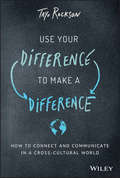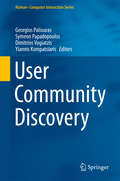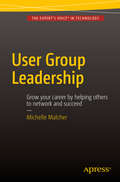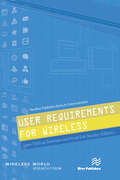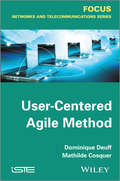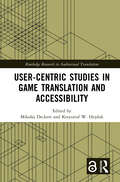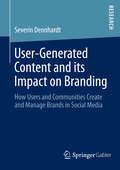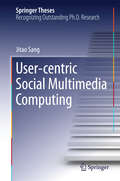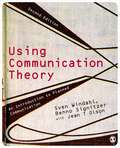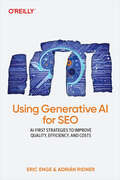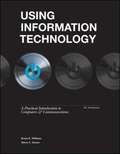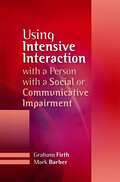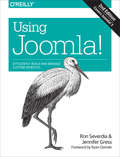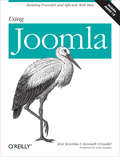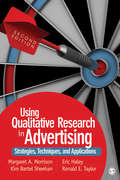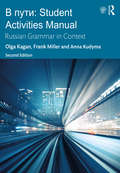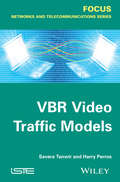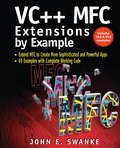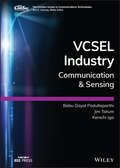- Table View
- List View
Use Your Difference to Make a Difference: How to Connect and Communicate in a Cross-Cultural World
by Tayo RocksonBecome more culturally competent in an increasingly diverse world Recent years have seen dramatic changes to several institutions worldwide. Our increasingly interconnected, digitized, and globalized world presents immense opportunities and unique challenges. Modern businesses and schools interact with individuals and organizations from a diverse range of cultural and national backgrounds—increasing the likelihood for miscommunication, errors in strategy, and unintended consequences in the process. This has also spilled into our daily lives and the way we consume information today. Understanding how to navigate these and other pitfalls requires adaptability, nuanced cross-cultural communication, and effective conflict resolution. Use Your Difference to Make a Difference provides readers with a skills-based, actionable plan that transforms differences into agents of inclusiveness, connection, and mutual understanding. This innovative and timely guide illustrates how to leverage differences to move beyond unconscious biases, manage a culturally-diverse workplace, create an environment for more tolerant schooling environments, more trusted media, communicate across borders, find and retain diverse talent, and bridge the gap between working locally and expanding globally. Expert guidance on a comprehensive range of topics—teamwork, leadership styles, information sharing, delegation, supervision, giving and receiving feedback, coaching and motivation, recruiting, managing suppliers and customers, and more—helps you manage the essential aspects of international relationships and cultural awareness. This valuable resource contains the indispensable knowledge required to: Develop self-awareness needed to be a cross-cultural communicator Develop content, messaging techniques, marketing plans, and business strategies that translate across cultural borders Help your employees to better understand and collaborate with clients and colleagues from different backgrounds Help teachers build safe environments for students to be themselves Strengthen cross-cultural competencies in yourself, your team, and your entire organization Understand the cultural, economic, and political factors surrounding our world Use Your Difference to Make a Difference is a must-have resource for any educator, parent, leader, manager, or team member of an organization that interacts with co-workers and customers from diverse cultural backgrounds.
User Community Discovery
by Georgios Paliouras Symeon Papadopoulos Dimitrios Vogiatzis Yiannis KompatsiarisThis book redefines community discovery in the new world of Online Social Networks and Web 2. 0 applications, through real-world problems and applications in the context of the Web, pointing out the current and future challenges of the field. Particular emphasis is placed on the issues of community representation, efficiency and scalability, detection of communities in hypergraphs, such as multi-mode and multi-relational networks, characterization of social media communities and online privacy aspects of online communities. User Community Discovery is for computer scientists, data scientists, social scientists and complex systems researchers, as well as students within these disciplines, while the connections to real-world problem settings and applications makes the book appealing for engineers and practitioners in the industry, in particular those interested in the highly attractive fields of data science and big data analytics.
User Group Leadership
by Michelle MalcherThis book is about starting and sustaining a technology user group. User groups are a wonderful way to connect with local and like-minded professionals for networking and learning. All the forums and social media on the internet can't replace face-to-face time spent discussing problems, upcoming technologies, and other pertinent topics. What every user group needs is leaders to organize meetings, find speakers, and connect the community. What every leader needs is good advice and guidance on how to begin a group and nurture new leadership to keep the group sustainable, and Michelle Malcher provides just that right sort of guidance in her book on User Group Leadership. This book is designed to help you understand what goes into starting and building a user group, giving you the tools and resources to do so. Learn what to expect before your first meeting, in the first three months, and in the first year. Malcher has experience from the local group level on up to the international level with the Independent Oracle User Group. If you're involved in technology and are ready to take on a position of leadership by which to help others network, succeed, and grow, then grab a copy of this book. You won't find a better source of guidance for starting and growing a new group on the technology of your choice. Learn what to know before you ever have your first meeting Prepare for each meeting with a list of things that should be done Grow your local members into future leaders What you'll learn Choose the right motivations for starting a group Build a governance structure and integrate with an umbrella group Locate and book interesting speakers Recruit help to share the administrative burden Grow the next generation of leadership Make a difference in people's careers by helping them grow and network and learn Who this book is for User Group Leadership is aimed at technology professionals interested in networking and learning with like-minded people in their same technology area. The book is especially aimed at the ambitious professional who is ready to step into a leadership role by creating a vibrant user community where no such community currently exists, but one is needed. Table of Contents 1. Development of a User Group 2. User Group Governance 3. Building Leaders and Volunteers 4. User Group Planning 5. User Group Members 6. Challenges 7. Career Development 8. From Techie to Leader 9. Qualities of a User Group Leader 10. Qualities of a User Group Volunteer
User Requirements for Wireless (River Publishers Series In Communications Ser.)
by Lene Tolstrup Sørensen Knud Erik SkoubyIn most IT system development processes, the identification or elicitation of user requirements is recognized as a key building block. In practice, the identification of user needs and wants is a challenge and inadequate or faulty identifications in this step of an IT system development can cause huge problems with the final product. The elicitation of user requirements as such changes according to age groups;, to gender,; to cultural settings,; and into time; and experience in the use of the system/software. User requirements, therefore, cannot be used between projects, IT systems, and different software. That makes the elicitation of user requirements an inherent part of any software development project and a resourceful activity as well. This book provides insights to the process of identifying user requirements and to different types by describing varying case studies in which technologies or software has been developed. A variety of user requirements are provided illustrating the effect of changing the targeted user group with respect to age,; to the context and the different technologies or software as well as to the difference in viewpoint on ways of involving users in the elicitation process. Cases and user requirement elements discussed in the book include: • User requirements elicitation processes for children, construction workers, and farmers• User requirements for personalized services of a broadcast company• Variations in user involvement• Practical elements of user involvement and requirements elicitation• Usable security requirements for design of privacy.
User-Centered Agile Method
by Mathilde Cosquer Dominique DeuffAgile development methods began to emerge around 20 years ago. However, it was not until the early 2000s that they began to be widely used in industry. This growth was often due to the advent of Internet services requiring faster cycles of development in order to heighten the rate at which an ever-greater number of functionalities were made available. In parallel, user-centered design (UCD) methods were also becoming more and more widely used: hence, user-centered design and agile methods were bound to cross paths, at least in the telecoms industry! During this period, in the field of telecommunications, the explosion in the number of connected terminals, Web applications, new use environments (particularly in a domestic setting), etc., meant it was crucial to gain a fuller understanding of users’ requirements and better evaluate the relevance and acceptance of services’ attempts to cater for these requirements. Thus the user-centered agile method, as proposed in this book, aims to mutually integrate two existing methods: user-centered design – as used by ergonomists – and the agile Scrum method – as used by developers. The user testing method is also covered. Analyzing work on this subject spanning the past 10 years, the authors also provide an assessment of the feedback on the user-centered agile method. The method described in this book has been based on all these sources. It is a framework relying on the logic introduced by Scrum, i.e. a framework based on project management. The method proposed is seen as an extension of Scrum which is “centered on humans” because of the integration of user-centered design and user-testing. Therefore the description of the user-centered agile method is based on the basics of the agile Scrum method and uses its terminology and elements. As well as descriptive elements of the user-centered agile method, practical examples of how to implement it are also provided. Contents 1. Introduction. 2. Intrioduction to the Methods Employed. 3. Sources for this Work. 4. Description of The User-Centered Agile Method. 5. Case Studies. About the Authors Dominique Deuff worked at the National Institute of Informatics in Japan for 2½ years before coming back to France in June 2006 and joining Orange Labs France Telecom as a developer in a Scrum team. In 2008, she graduated with a Master’s degree in ergonomics and has since then been applying her new skills to various projects at Orange Labs Lannion. Mathilde Cosquer joined Orange Labs as an ergonomist after completing her PhD on the question of transparency of technical devices from the user’s point of view. She has taken part in the design and evaluation of numerous innovating services, but over the past four years, she has been more particularly involved in projects of interpersonal communication services.
User-Centric Studies in Game Translation and Accessibility (Routledge Research in Audiovisual Translation)
by Mikołaj Deckert Krzysztof W. HejdukThis innovative collection makes the case for a push within the discipline to adopt user-centric perspectives on translated video games and their corresponding accessibility features.The volume demonstrates how audiovisual translation (AVT) and media accessibility (MA) involve decisions that can re-shape the gaming experience of players and other audiences. Contributions in the book outline this in two ways. First, they collectively provide an account of the prospects and challenges that come with user-centric scholarly inquiry in game translation and accessibility. Second, complementarily, they report on original studies and new, exciting findings while adopting the perspective of global users. Taken together, the collection serves as a call to action to systematically advance research eliciting variable types of input from users who take advantage of translation and accessibility services. Such research will facilitate a clearer understanding of how the particular decisions of translators and other relevant agents shape game reception.This book will be of interest to scholars in both translation studies and video game research, as well as those interested in media accessibility and media studies more broadly.Chapters 7 of this book is freely available as a downloadable Open Access PDF at http://www.taylorfrancis.com under a Creative Commons Attribution-NonCommercial-NoDerivs (CC BY-NC-ND) license.
User-Generated Content and its Impact on Branding
by Severin DennhardtThe emergence of social media as one of the driving forces of consumers' online experiences today also challenges our current understanding on marketing and brand management. The effects of brands' social media involvement are to this day uncertain. Severin Dennhardt shows that social media and user-generated brands do have a strong influence on brands. Four independent studies demonstrate that first, successful brands can be created in virtual worlds, second, user-generated content drives the creation of unique brands, third social media strongly influences the social value perception of brands, and fourth, social media impacts consumers' purchase decision process.
User-centric Social Multimedia Computing
by Jitao SangThis book presents the first paradigm of social multimedia computing completely from the user perspective. Different from traditional multimedia and web multimedia computing which are content-centric, social multimedia computing rises under the participatory Web2. 0 and is essentially user-centric. The goal of this book is to emphasize the user factor in facilitating effective solutions towards both multimedia content analysis, user modeling and customized user services. Advanced topics like cross-network social multimedia computing are also introduced as extensions and potential directions along this research line.
Using AI in Academic Writing and Research: A Complete Guide to Effective and Ethical Academic AI
by Dariusz Jemielniak Eldar Haber Aleksandra Przegalińska Artur KurasińskiThis book comprehensively explores how AI tools can revolutionize academic writing, research, grant proposals, and educational practices. With a focus on practical applications, ethical considerations, and future trends, the book serves as an indispensable roadmap for academics, researchers, and educators eager to integrate AI into their work. Whether you're looking to enhance your research capabilities, craft compelling grant proposals, personalize learning experiences, or lead your institution into the future, this book provides the insights and tools necessary to navigate and shape the AI-enhanced landscape of academia. It demonstrates how to redefine scholarly work with cutting-edge AI innovations through real-life, practical examples, yet keeping the level of generalization high enough to keep it relevant for a few years. By balancing specific, actionable insights with broader perspectives, this book equips readers to not only adapt to but actively influence the evolving role of AI in higher education, research, and funding acquisition, ensuring its value as a resource both now and in the coming years.
Using Communication Theory: An Introduction to Planned Communication
by Sven Windahl Benno H. Signitzer Jean T. Olsen‘Using Communication Theory was a rarity in bridging the gap between ideas and practice. It was itself a model of good communication and in its second, revised edition, it is still a most reliable and accessible guide to the lessons that communication theory and research offer to practitioners, especially in planning for change' - Denis McQuail, Professor Emeritus, University of Amsterdam ‘Using Communication Theory has become a classic in the education of communication. It is the comprehensive and self-evident source for theories and models, forming the base for the study of professions requiring communication planning' - Larsåke Larsson, Örebro University What does theory have to do with the practice of communication? Communication planning is used daily by thousands of people: public relations practitioners, technical writers, information campaigners, advertising professionals, organization consultants, educators, health communicators and more. Without a solid understanding of communication theory, practitioners have difficulty getting their messages heard. The second edition of this best-selling textbook has been updated with the student firmly in mind. With new learning features that directly engage with the practical side of theory, students will: · Practice what they learn with activities and exercises · Apply their own experiences to theory through prompts to reflection · Consolidate their learning with highlighted definitions and lists of key terms · Take it further with boxed excerpts from classic texts Showing how theories relate directly to the planning and experience of effective communication, Using Communication Theory - 2nd Edition provides indispensable insights into the practical nature of communication theory. In today’s landscape of communication overload, this book remains an essential, authoritative guide for both students and practitioners. Sven Windahl is based at the Nordisk Kommunikation. Benno Signitzer is Professor of Communication Studies at the University of Salzburg. Jean T Olson works in the public sector.
Using Generative AI for SEO: AI-First Strategies to Improve Quality, Efficiency, and Costs
by Eric Enge Adrián RidnerGenerative AI has brought artificial intelligence into the mainstream. The natural language capabilities of this technology provide digital marketers with exciting new ways to use AI in their day-to-day operations. Yet few SEO practitioners understand how to integrate this capability into their business. Using Generative AI for SEO is the first authoritative book dedicated to helping SEO practitioners effectively incorporate generative AI into their work. No matter where you are in your SEO journey, it's critical to get started so that your organization can gain a competitive advantage. This book provides the necessary background, knowledge, skills, and practical examples to get you working quickly and confidently with this essential new tool. Understand how generative AI can help you impact SEO Explore practical applications you can use right now Learn the competencies you'll need to ensure your toolkit remains relevant Improve content creation throughput while improving quality Consider risks and limitations of AI applications in SEO Build a generative AI capability within your organization
Using Information Technology (Tenth Edition)
by Brian Williams Stacey SawyerUSING INFORMATION TECHNOLOGY; A Practical Introduction to Computers & Communications 10/e "If there is anything we have learned during 18 years of writing and revising this computer concepts book, it is this: Not only does the landscape of computer education change rapidly, but so do the students. . . . This edition, then, is written for the Always On generation, helping students use technology to enrich their personal lives. " -Brian K. Williams & Stacey C. Sawyer
Using Intensive Interaction with a Person with a Social or Communicative Impairment
by Mark Barber Graham FirthIntensive Interaction is a highly effective approach for communicating and developing social interaction and engagement with difficult-to-reach individuals. This easy-to-use guide steers readers through the practical application of the approach, showing how positive results can best be achieved. The authors explain clearly how to prepare for, carry out and reflect on the use of Intensive Interaction with a client or family member. A multitude of key questions are addressed, including finding the right setting, evaluating progress and disengaging effectively at the end of a session. In the final section they consider some of the wider implications of the approach, such as developing confidence as a practitioner and incorporating Intensive Interaction into long-term care or educational planning. This practical and accessible book is a useful resource for speech and language therapists, occupational therapists, special school or further education teachers, social care professionals and anyone else caring for or working with people with social or communicative impairments. It will also be useful to practitioners already using the approach.
Using Joomla!: Efficiently Build and Manage Custom Websites
by Ron Severdia Jennifer GressIf you’re new to content management systems—or even new to building websites—this practical guide will get you up and running in no time. You don’t have to know much code, if any, to get started.Need to build a website quickly? Have a client that requires a powerful website with lots of compelling features? Ideal for web designers and developers alike, this updated edition takes you step-by-step through site creation with Joomla, with plenty of hands-on exercises along the way.Build a sample site throughout the book to see how Joomla! worksPlan and structure your site’s categories, articles, menus, and modulesLearn the ins and outs of creating, organizing, and displaying contentAdd images, audio, and video—and create complete image galleriesBuild a blog, set up an events calendar, and create custom user formsSell merchandise by putting together your own online storeEngage visitors by creating user profiles and hangoutsSecure your site and keep it optimizedMigrate to Joomla! 3 and update your third-party extensions
Using Joomla: Building Powerful and Efficient Web Sites
by Ron Severdia Kenneth CrowderWhy use Joomla? Because with Joomla you don't need to have any technical expertise or web design experience to create effective websites and web apps. Whether you're creating your first website or building a multi-function site for a client, this book provides straightforward, hands-on instruction that makes it easy to learn this open source web content management system.Written by members of the Joomla Leadership Team, Using Joomla helps newcomers quickly learn the basics, while developers with Joomla experience will pick up best practices for building more sophisticated websites. You'll also find more than a dozen ways to extend the functionality of existing Joomla-built websites. Start building with Joomla in minutes!Get guidelines for planning, creating, and organizing your contentUnderstand how to create and use Joomla templates to build websites quicklyExplore how components, modules, and plug-ins can extend your site's functionalityIncrease your site ranking by using Joomla best practicesUse built-in components such as banners, news feeds, polls, search, and web linksSet up an online store, calendar, photo gallery, discussion forum, and moreLearn important security precautions to safeguard your site
Using Qualitative Research in Advertising: Strategies, Techniques, and Applications (2nd Edition)
by Kim B. Sheehan Dr Margaret A. Morrison Dr Eric E. Haley Dr Ronald E. TaylorThis Second Edition remains the only book to discuss both theory and application of qualitative research techniques to inspire great advertising and build strong brands. Using a step-by-step approach created for students considering advertising careers and for those currently working in the advertising industry, this book explains what qualitative research techniques are designed to do. The text describes how these techniques aid in uncovering insights useful for advertising strategy development, creative development, and post-campaign evaluation. Practical information and discussions on interviewing, projective techniques, focus groups, and online/social media applications positioned within a theoretical context illustrate the value of qualitative research in the real world.
Utility Maximization in Nonconvex Wireless Systems
by Johannes BrehmerThis monograph develops a framework for modeling and solving utility maximization problems in nonconvex wireless systems. The first part develops a model for utility optimization in wireless systems. The model is general enough to encompass a wide array of system configurations and performance objectives. Based on the general model, a set of methods for solving utility maximization problems is developed in the second part of the book. The development is based on a careful examination of the properties that are required for the application of each method. This part focuses on problems whose initial formulation does not allow for a solution by standard methods and discusses alternative approaches. The last part presents two case studies to demonstrate the application of the proposed framework. In both cases, utility maximization in multi-antenna broadcast channels is investigated.
V Puti: Russian Grammar in Context
by Frank Miller Olga Kagan Anna KudymaThis highly successful program assists in the development of all the language skills (listening, speaking, reading and writing) by presenting realistic settings, situations and contexts. It consists of 12 chapters and can be used in an intermediate or advanced Russian course. V Puti offers conversational exercises, various readings (biographies, poems, literature and historical texts) and grammatical explanations and practice. All of these components reinforce Russian culture and history which enable the students to understand the Russian language in context. V Puti: Student Activities Manual is an integral part of the V Puti course. The structure matches the main textbook and provides a wealth of exercises and activities, either for class-use or homework.
VBR Video Traffic Models (Focus Ser.)
by Harry G. Perros Savera TanwirThere has been a phenomenal growth in video applications over the past few years. An accurate traffic model of Variable Bit Rate (VBR) video is necessary for performance evaluation of a network design and for generating synthetic traffic that can be used for benchmarking a network. A large number of models for VBR video traffic have been proposed in the literature for different types of video in the past 20 years. Here, the authors have classified and surveyed these models and have also evaluated the models for H.264 AVC and MVC encoded video and discussed their findings.
VC++ MFC Extensions by Example
by John SwankeExtend and modify MFC code to meet your needs! Author John Swanke delivers studied examples to give you a jump-start on creating more sophisticated and powerful applications. Each example is fully annotated and ready to insert into the your application --
VCSEL Industry: Communication and Sensing (The ComSoc Guides to Communications Technologies)
by Kenichi Iga Babu Dayal Padullaparthi Jim TatumA hands-on reference to the technical, commercial, and industrial aspects of VCSEL technology In VCSEL Industry: Communication and Sensing, a team of distinguished researchers and manufacturing professionals deliver a thorough and practical reference guide to vertical-cavity surface-emitting lasers (VCSELs) for young entrepreneurs, investors, venture capitalists, and researchers. The authors offer comprehensive descriptions of the technology involved, as well as a robust exploration of the industry and commercial landscape in which VCSELs exist. In VCSEL Industry: Communication and Sensing, distinguished researchers and manufacturing professionals Dr. Padullaparthi Babu Dayal, Dr. Jim A Tatum and Prof. Kenichi Iga deliver a thorough and practical reference guide to vertical-cavity surface-emitting lasers (VCSELs) for young entrepreneurs, investors, venture capitalists, and researchers. The authors offer comprehensive descriptions of the technology involved, as well as a robust exploration of the industry and commercial landscape in which VCSELs exist. The book contains numerous illustrations and schematics of the anatomy of VCSEL product developments and an insightful discussion of the proliferation of VCSELs in photonics and optics. There is also a dedicated section on photoreceivers used for VCSEL-based data communications and sensing. VCSEL Industry: Communication and Sensing provides readers with an accessible, commercial perspective of an important technology while offering just enough technical detail to make sense of the subject. The book also includes: A thorough introduction to VCSELs, including discussions of semiconductor lasers, materials, wavelengths, and why VCSELs are attractive for photonics applications Comprehensive explorations of the VCSEL industry, including market demands, an industry landscape, descriptions of commercial products based on VCSELs, and business models Practical discussions of VCSELs for data communication, including high-speed VCSELs, gain and parasitic effects on bandwidth and speed, and form factors and standards In-depth examinations of VCSEL arrays for sensing, including high-power VCSELs in consumer electronics Perfect for early-career researchers, engineers, entrepreneurs, investors, and managers, VCSEL Industry: Communication and Sensing will also prove to be an invaluable addition to the libraries of executives from across the semiconductor industry.
VLSI for Wireless Communication
by Bosco LeungVLSI for Wireless Communication, Second Edition, an advanced level text book, takes a system approach starting with an overview of the most up to date wireless systems and the transceiver architecture available today. Wireless standards are first introduced (updated to include the most recent 3G/4G standards in the second edition), and translates from a wireless standard to the implementation of a transceiver. This system approach is particularly important as the level of integration in VLSI increases and coupling between system and component design becomes more intimate. VLSI for Wireless Communication, Second Edition, illustrates designs with full design examples. Each chapter includes at least one complete design example that helps explain the architecture/circuits presented in this text. This book has close to 10 homework problems at the end of each chapter. A complete solutions manual is available on-line. VLSI for Wireless Communication, Second Edition, is designed as a primary text book for upper-undergraduate level students and graduate level students concentrating on electrical engineering and computer science. Professional engineers and researchers working in wireless communications, circuit design and development will find this book valuable as well.
VLSI, Communication and Signal Processing: Select Proceedings of the 5th International Conference, VCAS 2022 (Lecture Notes in Electrical Engineering #1024)
by R. K. Nagaria V. S. Tripathi Carlos Ruiz Zamarreno Yogendra Kumar PrajapatiThis book covers a variety of topics in Electronics and Communication Engineering, especially in the area of microelectronics and VLSI design, communication systems and networks, and signal and image processing. The content is based on papers presented at the 5th International Conference on VLSI, Communication and Signal Processing (VCAS 2022). The book also discusses the emerging applications of novel tools and techniques in image, video, and multimedia signal processing. This book is useful to students, researchers, and professionals working in the electronics and communication domain.
VMware Horizon View 6 Desktop Virtualization Cookbook
by Jason VentrescoIf you want a more detailed explanation concerning the implementation of several different core features of VMware Horizon View, this is the book for you. Whether you are new to VMware Horizon View or an existing user, this book will provide you with the knowledge you need to successfully deploy several core features and get introduced to the latest features of version 6.0 as well.
Vaadin 7 UI Design By Example: Beginner’s Guide
by Alejandro DuarteThis book is a hands-on Beginner's Guide for developers who are new to Vaadin and/or Vaadin UI components. The book will teach readers through examples to use each of the exciting components to build and add various aspects of the user interface to their web apps.If you have experience with the Java language and want to create web applications that look good without having to deal with HTML, XML, and JavaScript, this book is for you. Basic Java programming skills are required, but no web development knowledge is needed at all.
